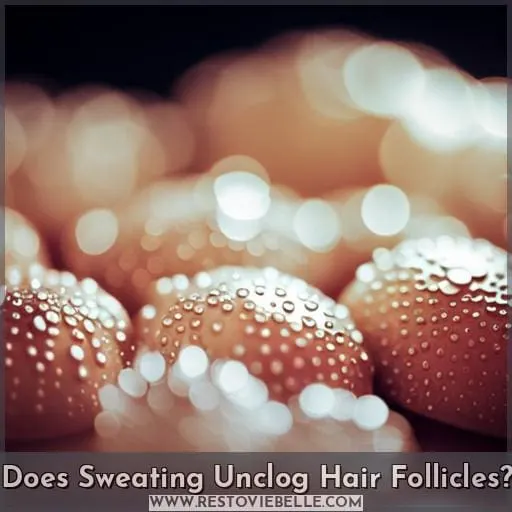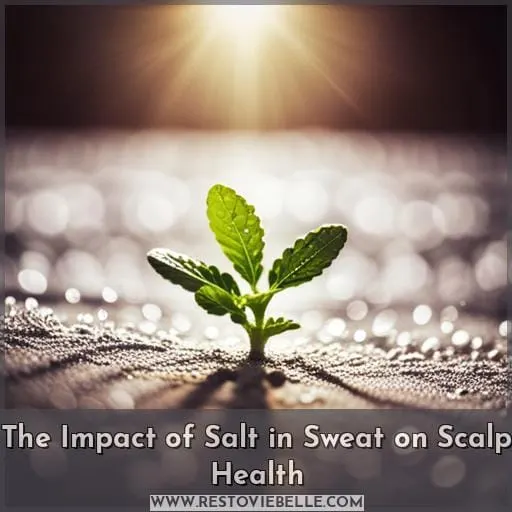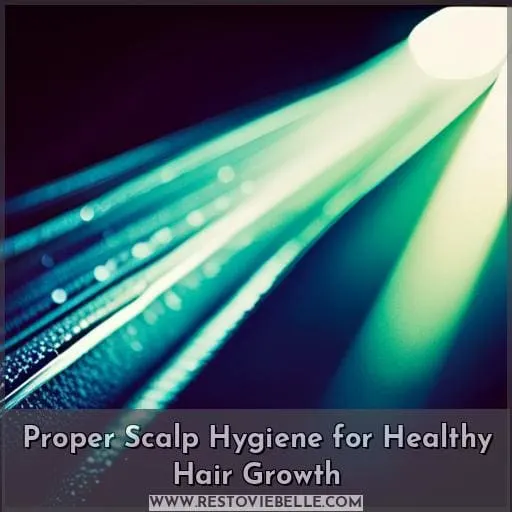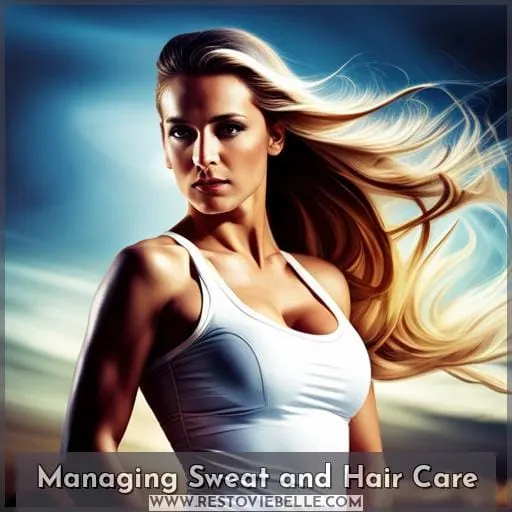This site is supported by our readers. We may earn a commission, at no cost to you, if you purchase through links.
 Imagine the feeling of sweat trickling down your forehead after an intense workout.
Imagine the feeling of sweat trickling down your forehead after an intense workout.
In this article, we will explore the question: does sweat really make your hair grow? Discover the fascinating relationship between sweating and hair growth as we delve into the science behind it. Get ready to uncover how something as simple as sweating can play a role in achieving healthier, stronger locks.
Table Of Contents
- Key Takeaways
- How Does Sweat Affect Hair Growth?
- The Role of Sweat Glands in Hair Health
- Does Sweating Unclog Hair Follicles?
- The Impact of Salt in Sweat on Scalp Health
- Proper Scalp Hygiene for Healthy Hair Growth
- Can Sweat Promote Faster Hair Growth?
- The Connection Between Exercise and Hair Growth
- Does Excessive Sweating Lead to Hair Loss?
- Managing Sweat and Hair Care
- Sweat and Hair Growth: the Truth Revealed
- Frequently Asked Questions (FAQs)
- Can sweat directly stimulate hair follicles to produce new hair growth?
- Is there a specific type of exercise that is most beneficial for promoting hair growth through sweating?
- Are there any negative effects of excessive sweating on hair health?
- How often should I wash my hair to maintain a balance between sweat and scalp hygiene?
- Can sweat from other parts of the body, such as the face or neck, contribute to hair growth on the scalp?
- Conclusion
Key Takeaways
- Sweat improves blood circulation to the scalp, delivering essential nutrients and oxygen for hair growth.
- Sweating unclogs pores on the scalp by removing dirt, oil, and dead skin cells.
- Salt in sweat exfoliates the scalp and promotes cleansing, unclogging hair follicles.
- Regular exercise and sweating promote faster hair growth, enhancing nutrient absorption for hair cells.
How Does Sweat Affect Hair Growth?
Sweat plays a significant role in the growth of your hair.
When you exercise and start to sweat, it actually helps improve blood circulation to your scalp, which is essential for maintaining healthy hair follicles. The increased blood flow delivers vital nutrients and oxygen that promote hair growth.
Additionally, sweating can help unclog the pores on your scalp by removing dirt, oil, and dead skin cells that may hinder new hair growth. However, proper hygiene is crucial as excessive sweating without regular cleansing can lead to build-up and potential scalp issues.
So remember to balance sweat with good scalp hygiene for optimal results in promoting healthy hair growth during puberty or at any age.
The Role of Sweat Glands in Hair Health
As you exercise and sweat, your body’s sweat glands play a crucial role in maintaining the health of your hair.
- Sweat benefits:
- Sweat helps regulate body temperature and remove toxins from the scalp.
- Scalp health: Sweating promotes blood circulation to the scalp, delivering essential nutrients for healthy hair growth.
- Hair growth: Sweat opens up hair follicles, allowing new strands to grow freely.
Proper hygiene is important to ensure that sweat doesn’t negatively impact your hair:
- Wash your hair regularly with a gentle shampoo to cleanse away sweat and dirt.
- Use a conditioner or moisturizer after washing to maintain hydration levels in both scalp and strands.
- Avoid excessive heat styling as it can lead to dryness and damage.
By taking care of your scalp hygiene amidst sweating, you can maximize the benefits of sweating for healthier-looking locks.
Does Sweating Unclog Hair Follicles?
Now that we understand the role of sweat glands in hair health, let’s explore whether sweating can effectively unclog hair follicles.
Sweat has been known to have numerous benefits for scalp health and overall hair growth. When you sweat, it opens up your pores and helps remove any buildup or debris that may be clogging your hair follicles.
However, it’s important to note that proper hygiene practices are crucial when it comes to managing sweat and maintaining a healthy scalp environment for optimal hair growth.
| Sweat’s Effectiveness | Scalp Health | Hair Follicle Function |
|---|---|---|
| Opens up pores | Promotes circulation | Prevents blockages |
| Maintains cleanliness | Stimulates nutrient | Encourages new |
absorption hair growthThe Impact of Salt in Sweat on Scalp Health
When it comes to maintaining a healthy scalp, the impact of salt in your sweat can’t be overlooked.
Salt plays a crucial role in scalp health and hair growth.
Sweat contains salt that helps to exfoliate the scalp, removing dead skin cells and promoting overall cleansing of the scalp.
Additionally, salt has antibacterial properties that can help prevent infections on the scalp.
However, it’s important to maintain proper hygiene by regularly washing your hair to ensure sweat doesn’t build up excessively and cause any negative effects on your scalp or hair health.
Proper Scalp Hygiene for Healthy Hair Growth
To maintain healthy hair growth, it’s important for you to prioritize proper scalp hygiene.
Scalp care plays a vital role in maintaining the health of your hair and promoting its growth.
Regularly cleansing your hair and scalp helps to remove dirt, excess oil, and product buildup that can clog follicles and hinder new hair growth.
Finding the right balance between sweat production and maintaining clean, hydrated hair is crucial for overall scalp health.
Using gentle shampoos designed for your specific needs can help regulate oiliness without stripping away natural moisture.
Remember to avoid harsh scrubbing or using hot water when washing your hair as this can cause irritation or dryness.
Can Sweat Promote Faster Hair Growth?
If you exercise regularly, sweat can help promote faster hair growth.
When you work out and start to sweat, the increased blood circulation in your scalp delivers more nutrients and oxygen to your hair follicles.
Sweat also helps unclog the pores on your scalp by removing dirt, oil, and dead skin cells that can block hair follicles.
Additionally, sweating allows for better absorption of essential nutrients into the scalp for optimal hair growth.
It’s important to maintain proper hygiene practices after sweating to prevent any buildup or damage that could hinder healthy hair growth.
The Connection Between Exercise and Hair Growth
Regular exercise plays a crucial role in promoting hair growth. When it comes to your mane, physical activity offers more than just the obvious health benefits.
- Increased Scalp Circulation: Exercise improves blood flow throughout your body, including the scalp. This increased circulation delivers essential nutrients and oxygen to the hair follicles, promoting healthy growth.
- Stress Reduction: Sweating during exercise helps relieve stress, which is known to contribute to hair loss. By reducing stress levels through regular workouts, you can maintain a healthier environment for your follicles.
- Improved Hair Hygiene: Engaging in physical activity often means sweating more frequently. While sweat itself doesn’t directly promote hair growth, maintaining proper scalp hygiene by regularly washing away sweat and impurities can prevent clogged pores and support optimal conditions for new strands.
- Enhanced Nutrient Absorption: Regular exercise enhances nutrient absorption throughout the body by improving metabolic function. These absorbed nutrients play a vital role in nourishing both skin and hair cells.
By incorporating regular physical activity into your routine while practicing good hygiene habits, you provide an ideal foundation for healthy hair growth that goes beyond appearances alone.
Does Excessive Sweating Lead to Hair Loss?
Excessive sweating can actually contribute to hair loss.
When you sweat excessively, it can affect the health of your scalp and ultimately lead to hair loss. Sweat contains salt, which when left on the scalp for too long, can dry out your skin and clog hair follicles.
This hampers new hair growth and may cause existing hairs to fall out prematurely.
Additionally, excessive sweating often occurs in situations of high stress or intense physical activity, both of which have been linked to increased levels of cortisol – a hormone that’s known to negatively impact hair growth.
Therefore, managing sweat through proper hygiene practices and finding ways to reduce stress levels are crucial for maintaining a healthy scalp environment and promoting optimal hair growth.
| Excessive Sweating & Hair Loss |
|---|
| Impact on Scalp Health |
| Excess sweat dries out the scalp |
| Clogged follicles hinder new growth |
Managing Sweat and Hair Care
Now that we’ve explored the impact of excessive sweating on hair loss, let’s shift our focus to managing sweat and hair care.
Proper scalp care and hygiene basics are essential for maintaining healthy hair growth. Sweat management plays a crucial role in preventing clogged follicles and promoting overall scalp health. By incorporating effective sweat management techniques into your routine, you can ensure that your hair stays clean, fresh, and vibrant.
Here are four key tips to help you manage sweat effectively:
- Regularly wash your hair with a gentle shampoo designed for your specific needs.
- Keep your scalp clean by washing away dirt, oils, and debris after exercise or periods of intense sweating.
- Use products formulated for active individuals that balance moisture levels while providing nourishment to both the scalp and strands.
- Avoid overwashing or using harsh chemicals as they may strip away natural oils needed for healthy hair.
By following these simple steps in managing sweat alongside proper hygiene practices,you’ll be well on your way to achieving luscious locks while keeping any concerns about excess perspiration at bay!
Sweat and Hair Growth: the Truth Revealed
To uncover the truth about sweat and hair growth, let’s explore how sweating can affect the health and growth of your hair.
Sweating actually has several benefits for scalp health and overall hair care.
When you sweat, it helps to unclog your follicles by clearing away any build-up that may hinder new hair growth.
Additionally, sweat contains natural antibacterial properties that protect the skin on your scalp from infections or germs.
It’s important to maintain proper hygiene after exercising or excessive sweating to ensure clean clothes and promote skin wellness.
So while sweat itself may not directly make your hair grow faster, its impact on scalp health can contribute to healthy hair growth.
Frequently Asked Questions (FAQs)
Can sweat directly stimulate hair follicles to produce new hair growth?
Sweat indirectly stimulates hair follicles by improving blood circulation to the scalp, delivering essential nutrients and oxygen. This promotes a healthy environment for hair growth, but sweat itself doesn’t directly stimulate new hair growth.
Is there a specific type of exercise that is most beneficial for promoting hair growth through sweating?
Engaging in regular cardiovascular exercises, such as jogging or cycling, can maximize the benefits of sweating for hair growth. These activities improve blood circulation and nutrient delivery to the scalp, promoting healthier follicles and stimulating new hair growth.
Are there any negative effects of excessive sweating on hair health?
Excessive sweating can negatively impact hair health by causing:
- Dehydration
- Scalp irritation
- Accumulation of sweat residue, which can clog hair follicles and hinder natural growth.
Proper hygiene practices are essential to mitigate these effects.
How often should I wash my hair to maintain a balance between sweat and scalp hygiene?
To maintain a balance between sweat and scalp hygiene, wash your hair every two to three days.
Over-washing can strip natural oils, while infrequent washing may lead to buildup.
Find the right frequency for healthy hair growth.
Can sweat from other parts of the body, such as the face or neck, contribute to hair growth on the scalp?
Sweat from other parts of the body doesn’t directly contribute to hair growth on the scalp.
Hair growth is primarily influenced by factors such as genetics, hormones, and overall scalp health.
Conclusion
To conclude, sweat does have a role in promoting hair growth.
Sweat helps to unclog hair follicles and maintain scalp health by eliminating toxins and excess oil.
However, excessive sweating can lead to hair loss if not properly managed.
It’s important to maintain proper scalp hygiene and balance sweat production to maximize the benefits of sweat on hair growth.
So, the next time you break a sweat, remember that it isn’t just beneficial for your overall health, but also for the health and growth of your hair.
















